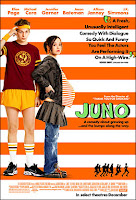 Virginia Rutter (the gal who brought us “Who Votes Their Gender?” the other week) took time out from writing college lectures to pen this excellent review of Juno from the perspective of a sex researcher. As you likely know by now, Juno was just nominated by the Academy for four Oscars, including Best Film, and Best Actress (Ellen Page). We’re bound to see a continued discussion of the issues the film raises in coming months, and here Virginia calls our attention to something other reviewers have overlooked: the way our culture talks about–or rather, doesn’t talk about–luuuvvv. -GWP
Virginia Rutter (the gal who brought us “Who Votes Their Gender?” the other week) took time out from writing college lectures to pen this excellent review of Juno from the perspective of a sex researcher. As you likely know by now, Juno was just nominated by the Academy for four Oscars, including Best Film, and Best Actress (Ellen Page). We’re bound to see a continued discussion of the issues the film raises in coming months, and here Virginia calls our attention to something other reviewers have overlooked: the way our culture talks about–or rather, doesn’t talk about–luuuvvv. -GWP
Can We Talk about Love, Please?
The movies are giving demographers, sociologists, and sex researchers a boost these days. Movies about unwanted pregnancy that eschew abortion, such as Juno, Knocked Up, and Waitress, are giving gifted columnists (like Ellen Goodman and Carrie Rickey) a chance to contemplate where the culture stands with respect to unwanted pregnancy, early motherhood, and all things youthful, tawdry, and anxiety producing for those of us who consider ourselves grown ups now. Those kids are different from us grown ups, and the problems that they have are about the mechanics of sex, and the rules and practices around abortion, adoption, and teen delivery.
Meanwhile, it is Christmas in January for a sex researcher. There is a lot of important teen sex and unwanted pregnancy news out there, too. Abortion rates are down, Guttmacher reports. The fantasized link between teen pregnancy and poverty is screwy, as reported to the Council on Contemporary Families, and instead, poverty is caused by (who’d a thunk it?) the economy. Ouch. How unromantic.
But I don’t want to write about that, any more than I want to write my sociology lectures or finish my latest sex data analysis, right now. The cultural theme that Juno raised for a lot of commentators is whether we as a society are making sex and reproductive decisions look too easy and too simple.
Mind you, the main theme, focused on a woman’s body, seems to have crowded up some other ideas that matter. I have wondered why we haven’t detected a cultural story to be told here in this movie about the fact that:
1. Consequences of sex are a component of the plot in Juno, just as they are in Knocked Up; and
2. The boy, Paulie Bleeker (played by Michael Cera), though not as touched by the pregnancy crisis as the girl, Juno MacGuff (played by Ellen Page) remains a large focus of the unfolding story of the consequences of sex.
But, like I said, none of this grips me. You know what grips me? Love. And I’m convinced that we just don’t talk about it enough.
http://www.blogger.com/img/gl.link.gif
The value and pleasure of Juno was that it was a story of love—where the kids sing to each other “you’re a part time lover and full time friend.” In the messy, dull, weird world of conformity and reticence that dominates high school relationships, Juno sweetly offers a story of shy, sweet, but steadfast friendship and romantic love.
Family love was there too. I was touched by the love and acceptance that the father showed his daughter, even as he was befuddled by her choices. I cheered at the loyalty portrayed by the stepmother when she dressed down the judgmental ultrasound operator. This is the kind of love we can live with, the kind of love that we need in order to live, survive, thrive, and just be good people. It isn’t “kill yourself love” like we get from movies like Titanic, which is the kind of love we are more likely to glamorize and talk about.
Cultural commentators, chief among them Stephanie Coontz, highlight the way in which marriage itself has been transformed from an institution based on commitment to an institution based on love. We’ve got a host of politicians who respond to this reality with hand-wringing about the loss of old-fashioned commitment. But we will do well to contemplate, elucidate, illustrate and talk about ways to love skillfully, kindly, and with compassion and acceptance that were illustrated in Juno. In the end, love—doable, realistic, everyday love–was the protective envelope (not marriage, not traditional values) that made us see that Juno the teen mother was going to be okay. In other words, love, done right, serves the kind of social purpose that commitment and traditional values do. And jeepers, the songs are so sweet when they are about love.
Since, despite my impulses, I have to keep working on my sociology lectures and my sex research, I have a nice little social science illustration for why love matters that brings us full circle to thinking about teen sex. In her research, Amy Schalet (UMass-Amherst) contrasted how teens and their parents in the United States think about and communicate about sexuality as compared to in The Netherlands. She found that Dutch parents and teens actually believe that young people can experience love, can be in love, and that love is an important prerequisite to sexual activity, while in the United States, parents are skeptical of their teenagers’ capacity to be in love, and instead keep expressing the view that boys and girls must be in some kind of antagonistic, sexual arms race. The lesson in Professor Schalet’s work: the age of first sex is higher and the rates of unwanted pregnancy and STDs are lower among Dutch versus American youth. Valuing love works. Don’t forget it.
I say, up with Juno! Up with love! Now, to write lectures and look at data.









